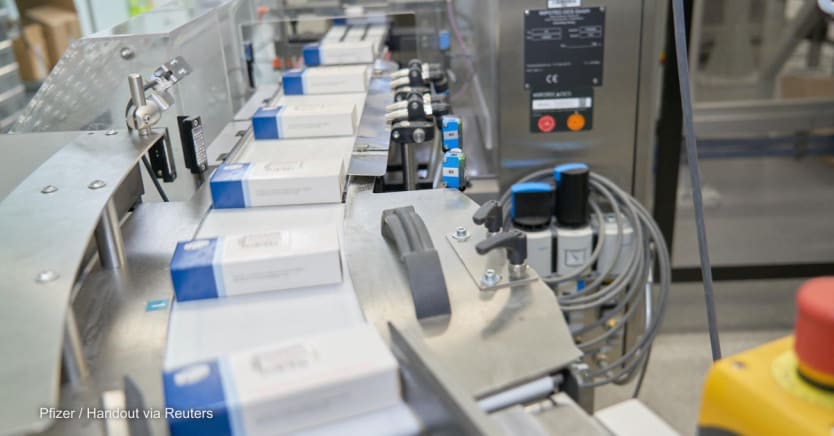
A new public-private group, called the COVID Treatment Quick Start Consortium, launched Wednesday to provide oral antiviral treatments for COVID-19 in 10 low- and middle-income countries where the drugs remain out of reach for many people.
Duke University, the Clinton Health Access Initiative, the COVID Collaborative, and Americares will serve as the consortium’s implementing partners, while Open Society Foundations, the Conrad N. Hilton Foundation, and Pfizer will be providing financial support. Pfizer will also be donating 100,000 courses of its antiviral therapy, Paxlovid. The consortium will be working with ministries of health in Ghana, Kenya, Laos, Malawi, Nigeria, Rwanda, South Africa, Uganda, Zambia, and Zimbabwe, to introduce oral COVID-19 antivirals such as Paxlovid.
This broad consortium builds on earlier commitments in May by some of the partners that have announced their intent to increase access to COVID-19 testing and treatments in low- and middle-income countries.
The organizations came together amid increased calls for access to oral COVID-19 antivirals in LMICs, as COVID-19 variants and subvariants continue to circulate globally. High-income nations such as the U.S. have been using therapies such as Lagevrio, the brand name of the oral COVID-19 antiviral treatment molnupiravir, and Paxlovid. But many in LMICs have no access to the drugs, or know about them, as Devex reported last week.
Agreements have been made to manufacture generic versions of the drugs to boost supply and allow access in several LMICs. But to date, only Pfizer’s Paxlovid has received WHO prequalification, which ensures the drugs meet quality standards, and are safe and effective.
David Ripin, executive vice president and chief scientific officer at CHAI, said there are multiple ways to get the drugs to countries, but donations are “the fastest way” for them to reach high-risk populations.
“We do believe that an approach like this is the fastest way and it's one more tool we have to get [the] product into countries,” he said.
The Access to COVID-19 Tools Accelerator, or ACT-A, partners have started deliveries of molnupiravir, but face bottlenecks in negotiating for access to Paxlovid. Generic versions of the drug are still not available, according to Unitaid, and several factors such as high pricing and lack of transparency are prolonging their negotiations with Pfizer.
A spokesperson for Pfizer wrote to Devex that the company has been working with the World Health Organization and other ACT-A partners to develop a short-, medium-, and long-term access strategy to Paxlovid and that it has been “flexible, receptive to the feedback, and committed to making adjustments to advance the negotiations.”
The spokesperson said access to early testing and diagnosis has been a barrier to the rollout of Paxlovid in LMICs and that it has signed a letter of intent to join the consortium to address that challenge and improve access to COVID-19 treatments in these countries.
Why Paxlovid is still not available in many LMICs
According to a recent report, several health workers from Nigeria, Madagascar, and Haiti have never heard of novel antivirals for COVID-19, including Paxlovid. Meanwhile, in countries such as Peru and Jamaica, Paxlovid has not yet been approved for use.
The company has also been ready since the start of April to ship courses of Paxlovid as per its agreement with UNICEF in March for the procurement of up to 4 million courses of the drugs in 2022. “However, implementation has been delayed due to UNICEF’s request to renegotiate certain terms of the agreement,” the spokesperson said.
Devex reached out to UNICEF on what terms it is renegotiating with the pharmaceutical company, but the U.N. agency didn’t elaborate in its response.
“UNICEF locked in volumes of paxlovid for low-income countries in March but continues, in collaboration with ACT-A partners, to negotiate with Pfizer to lift conditionalities to ease access,” the U.N. agency said in a written response.
However, allocations have been made for molnupiravir, and the first shipment of the drug arrived in Cambodia last month, while they await other countries to approve the drug for use, UNICEF wrote.
Other challenges
The consortium expects patients at risk of severe COVID-19 to start receiving the treatments in some countries this month. But several factors could delay the introduction of the drugs . That includes regulatory approval of the drug, determining how tests and treatments will be delivered, and ensuring the health workforce in countries are able to perform test-and-treat activities.
At the moment, of the 10 countries participating in the initiative, only Rwanda and Zambia have approved Paxlovid, according to a CHAI spokesperson.
Testing also remains a challenge. Paxlovid needs to be taken within five days of the onset of COVID-19 symptoms, and a practical, fast way to know if one has COVID-19 is through self-testing. However, these are not widely available in several low- and middle-income countries.
“I think, ultimately, we have to uncover why is it that self tests have not been widely adopted,” Ripin said, adding that there should also be urgency in getting self-testing products in countries and into the hands of those most at risk for severe COVID-19, so they can start treatment early.
He however emphasized the importance of government ownership and leadership in moving a lot of things forward, not just in approving the products for testing and treatment, but also in how to deliver them to populations in need.
He hopes that test-and-treat programs will be up and running in the countries within the year. While that will depend on a country-by-country basis, Rwanda is likely to be the first country to do so, as soon as the end of September, according to a CHAI spokesperson.
While the “quick” in the consortium's name indicates a sense of urgency, Ripin said he is also aware it will take time, adding, “Starting a program like this isn't like a light switch.”

Search for articles
Most Read
- 1
- 2
- 3
- 4
- 5








